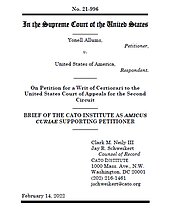Yonell Allums was indicted for his alleged role in a conspiracy to traffic various drugs. The government charged that he had distributed over 5 kilograms of cocaine and small amounts of heroin and marijuana, and also that he used a firearm in furtherance of this conspiracy. But the jury acquitted him of the most serious charges, finding only that he had distributed small amounts of cocaine and marijuana – i.e., the jury rejected the government’s allegations that Allums had trafficked heroin and large amounts of cocaine, and it rejected the firearm charge entirely.
At sentencing however, the judge sentenced Allums based upon both the higher quantities of drugs and the firearm possession, notwithstanding that the jury had acquitted the defendant as to this conduct. If Allums had been sentenced based solely on the conduct for which the jury convicted him, his sentencing range would have been 57 to 71 months. But because the judge relied on his acquitted conduct as well, he sentenced Allums to 240 months – a roughly four-fold increase. The Second Circuit affirmed Allums’ sentence, and Allums filed a cert petition, asking the Supreme Court to resolve a fundamental question of criminal procedure that has now been percolating for many years – does the Sixth Amendment allow a federal court to sentence a defendant based on conduct underlying a charge for which the defendant was acquitted by a jury?
Cato has filed an amicus brief in support of the petition, arguing that the practice of sentencing defendants based on acquitted conduct is inherently at odds with the understanding of the jury trial in the Anglo-American legal tradition, and especially contrary to the special sanctity and unassailable finality of jury acquittals. Permitting sentencing based on acquitted conduct not only denies criminal defendants their Sixth Amendment right to a jury trial, but also denies the community their proper role in overseeing the administration of criminal justice. As three members of the Court have recently noted, “[t]his has gone on long enough.” Jones v. United States, 135 S. Ct. 8, 9 (2014) (Scalia, J., joined by Thomas & Ginsburg, JJ., dissenting from denial of certiorari).
It is especially important to protect the sanctity of jury acquittals now, in light of the near-disappearance of the criminal jury trial generally. Today, jury trials have been all but replaced by plea bargaining as the baseline for criminal adjudication, and there is ample reason to doubt whether the bulk of these pleas are truly voluntary. If defendants know they may be sentenced based even on acquitted conduct, that massively ratchets up the pressure to accept a plea in any case where the prosecutor charges multiple, related offenses, as even acquittals on the more serious charges are no guarantee against harsh sentencing. Precluding sentences based on acquitted conduct would therefore be a small but vital safeguard against the wholesale erosion of the jury trial itself.



